Student Blog
Joyce
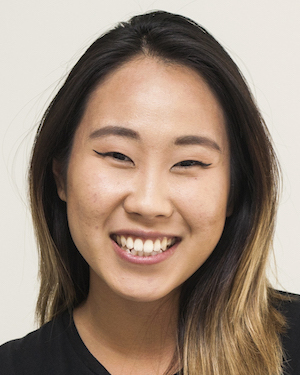
Some People are Worth Melting For ⟩
January 15, 2019, by Joyce
Getting Involved What are OS/OT?
This winter break I decided to do something a little bit different. Instead of flying back home to NYC, I decided to spend it in LA with the friends I made here. The entire city felt a little bit different. I wasn’t rushing to class or to the clinic. I had more time to actually clean my room and my loads of laundry. I could stay up watching midnight movies because there was nothing to wake up to the next morning. No studying . . . nothing.
I’m not exactly sure what my plans after graduation will be so I wanted to take advantage of this city while I still had the chance. Looking back, I was shocked to see how my life in LA filled up with a strong supportive network of beautiful souls.
Here are some highlights.
Admission Holiday Lunch
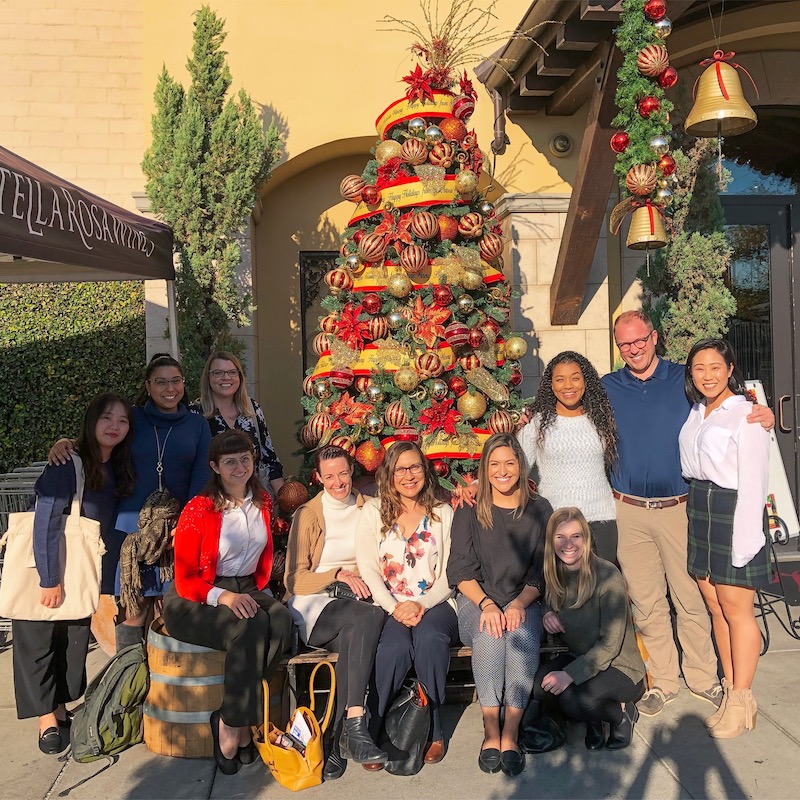
As many of you might understand, it’s almost impossible to get everyone together in one place for one meal. So it was heartwarming to get together with the admissions team for a sit down meal outside of school. We went to San Antonio Winery for lunch and it was a great start to the holiday festivities as we engaged in conversations that were non-work related, ate great food, and just got to know each other a little bit more.
Cabin Fever
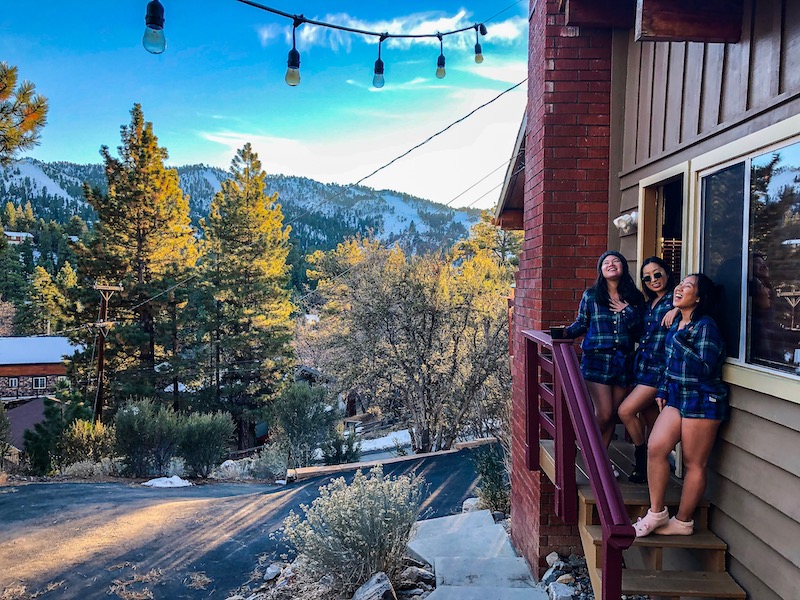
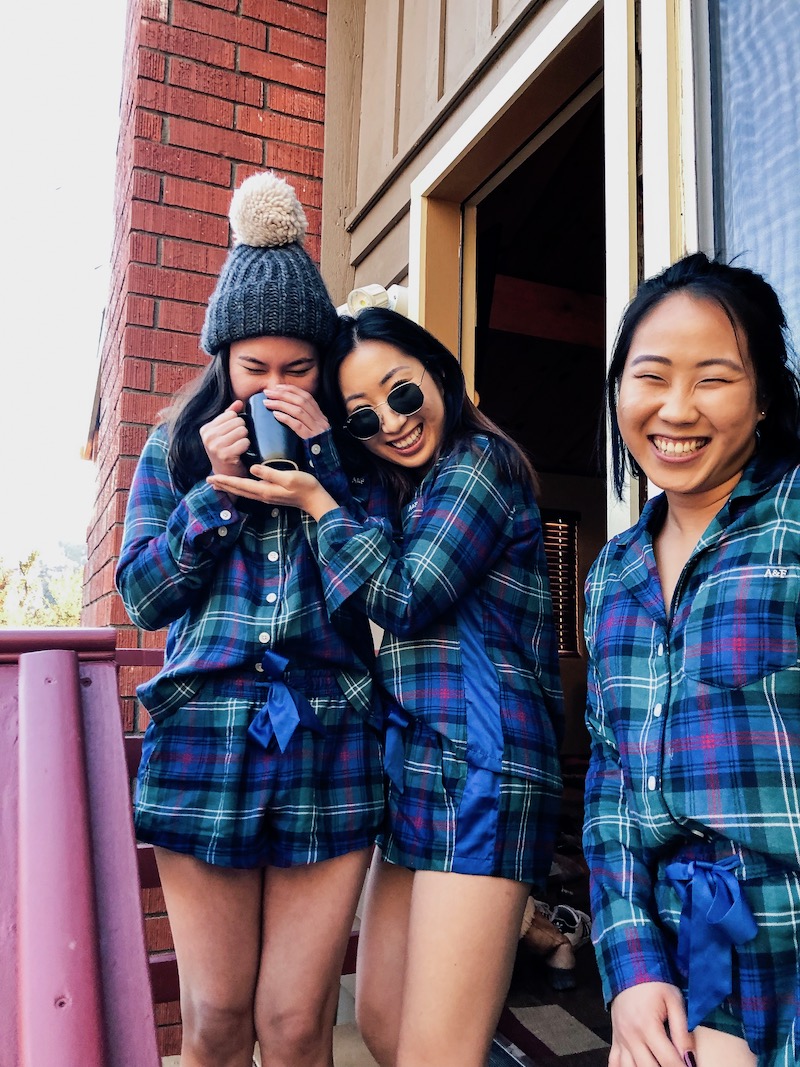
With my closest OT sisters, I went on a cabin trip to Big Bear Lake. This was my first time there! We rented out an Airbnb and did absolutely nothing but chilled. We watched Lord of the Rings and Moana. We cooked KBBQ, tacos, and yes . . . a kale salad. We baked cookies at 10pm because we wanted to. The snow was melting during our stay, but it was nice to get away from the city for a week to breathe in fresh air and enjoy the stars at night!
Mario-Kart IRL
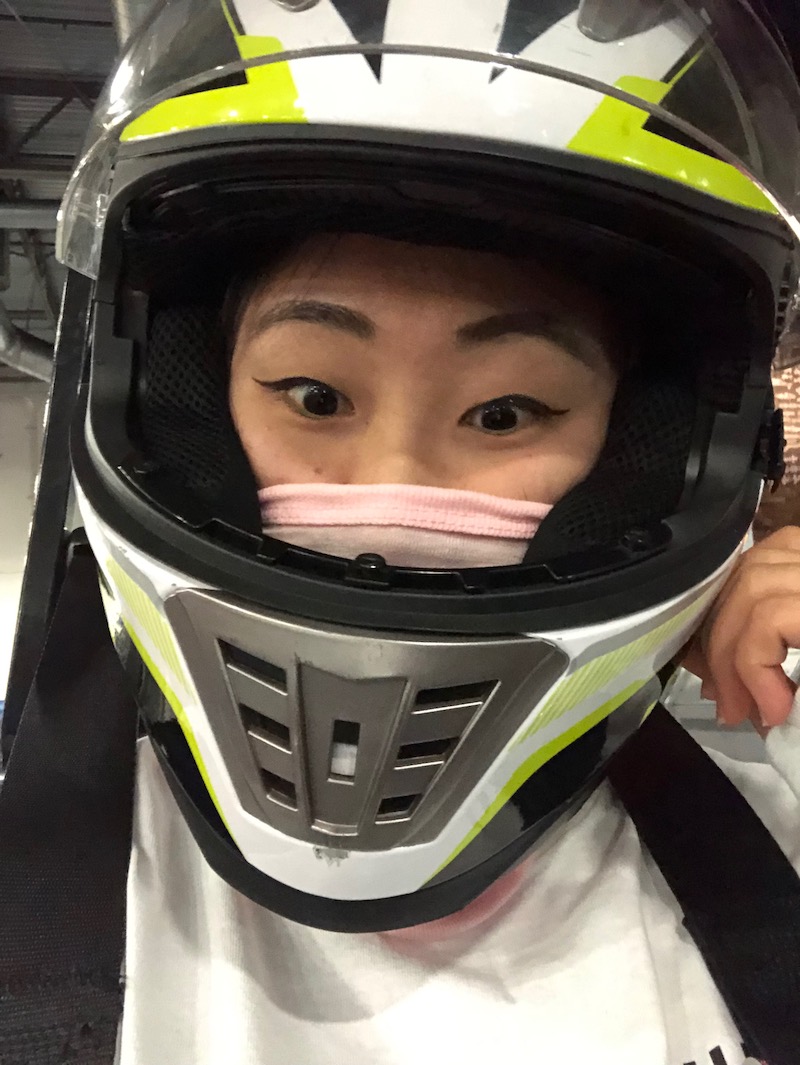
No I did not win . . . I went go-karting this winter break and I realized that it was not as easy as they make it look like in the games. I raced twice. The first time, I wasn’t sure what to exactly to expect so I was very anxious. The go-karts themselves go up to 40MPH and I do not bode well with speed. I was that person . . . blocking everyone else . . . holding people up . . . oh and did I mention I rammed right into the wall? The second time around, I realized that I wanted to just enjoy the ride and thought of it as a leisure ride. I let the fast speeders go past me. I don’t mind being last place!
Winter break was a nice time to enjoy and explore the city of Los Angeles without the schedule and structure of school/work. However, I’m really excited for the new things that are happening this spring semester, like externships, electives, graduating . . . but that’s for a later post!
⋯

Can I do Grad School? ⟩
December 4, 2018, by Joyce
This was a big question that I find many people asking themselves. Whether you’re contemplating graduate school right after undergrad or going back after years of not studying, it seems to be a daunting choice to give up a salary to study full time.
Grad school is truly unique in its own way, way more so than undergrad ever was. From simply a developmental perspective, we are still finding ourselves in undergrad . . . our identity, who we are and what we want to be. However, in grad school you’re one step closer to consolidating the path in which you want to embark on.
Personally, I struggled a lot with low self esteem in college, shape shifting to match the peers around me and truly plagued with the disease to please. It wasn’t until senior year of college where I found comfort in being myself. Chasing after OT only reaffirmed the comfort I found within myself which is why I decided to pursue grad school immediately. I did not want to take a gap year because I was so sure on pursuing OT that I did not want to wait any longer. In that way, because I was used to the flow of school, exams, and papers . . . academically it wasn’t a difficult transition. That being said, it wasn’t an easy social transition. I had to pick up everything I had on the east coast and move to the other side of the country. I was couch hopping the first couple of weeks. I had a two week break between the day of my undergraduate graduation and the beginning of the graduate program. I definitely found myself burnt out many times and questioned whether this was the right choice I made.
But I am a firm believer of finishing what you started. Grad school was daunting at first. You meet many students who are just as passionate as you – which can be inspirational or scary. It is a game of perspective, will you view them as peers to learn from or simply competition to hide from? What’s great about OT school is that the program begins with our faculty encouraging us to learn from each other, to use each other to expand and challenge our clinical reasoning. Reflecting now, I’m glad that I made the choice to come to USC when I did because it gave me the opportunity to make life-long friends and receive strong mentorship with many of the faculty that went through the program themselves.
If you’re hesitating on applying to grad school, I would start with reflecting on why. Is it fear? Fear of school or fear of starting something new? One thing that is for sure is that no one goes through grad school alone, we do it with the support of our friends, professors, and social support!
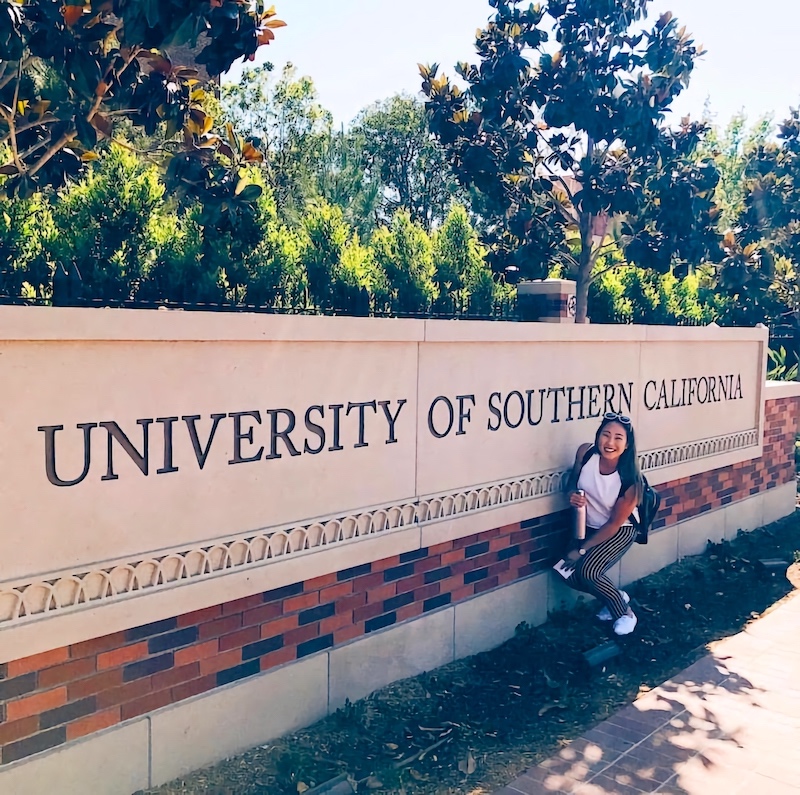
⋯

Can I Work In Grad School? ⟩
November 8, 2018, by Joyce
My answer to you would be that it depends. I know, everyone’s favorite answer to hear. However, I say it depends because it truly is dependent on the kind of learner you are and how efficient you are in managing your time.
In the beginning of the program (summer session) I chose not to work because of the intensity of the program (M-F 8AM-4PM). In addition to the academic and coursework, I was also couch hopping because I literally picked up my entire life and moved across the country. There was a lot of instability and uncertainty during that summer and if I were to add that extra dimension of work, I knew it would take a physical, mental, and emotional toll.
Thankfully I survived the summer program and in the fall semester, I began my Adult Rehabilitation Immersion. Each practice immersion varies but the Adult Rehabilitation one is known for its intense studies in various medical diagnoses and conditions. Therefore, I decided that this semester would not be the best semester to start working because I would much rather absorb and obtain this information to the best of my abilities without any other distractions. Not working and taking out additional loans opened up space in my schedule to read my notes and study a few extra hours.
It was when I began the Mental Health Immersion that I felt that there was enough room and space in my life to add a part time job. Therefore, I began to work as a hostess at a Korean BBQ restaurant. My shifts required me to be in on the weekends. I had a great time, it was nice to be involved in something non-OT related. Don’t get me wrong, I love the profession and I love the people that I interact with but working at a restaurant brings about a different kind of aura. I met many international travelers (as our restaurant is rated 4.5 stars on yelp and highly popular amongst tourists!). I enjoyed the customer service aspect and even casually conversing with people as they walked in and out of the restaurant.
I came home pooped from standing all day but it was nice to be able to make some money and use a different set of skills. So to answer your question, yes it is possible to work while you study. But in the midst of it, remember that you are still a student first and that your academics takes priority. Something that I have learned to do is weighing the pros and cons of the situation. Is it worth losing three hours of sleep every night to work a few hours and do homework to earn maybe $50? I guess it would depend on the kind of part time job you decide to pick up as well. I have classmates who babysit for higher rates for shorter times and others who work longer shifts in the food industry but making most of their income on tip.
So, is it doable? Yes, but it depends.
⋯

How to Apply to Grad School ⟩
November 1, 2018, by Joyce
It’s tough. I thought I was done with common app years ago never having to go through such a system again. But luckily, it is possible and applying to grad schools does not have to be as stressful as it sounds! Hopefully these few tips will help you with your application journey:
1. Get to know the system
&& I mean every system, the OTCAS, the GRE website, the USC admissions portal. Each website and server that the school uses varies. Become familiar with each of them so you understand how they work and function. I usually take a day just to make an account (also write your password somewhere so you don’t forget it!) to understand the system and then walk away from it. It’s important to do things in small increments because I find that doing everything at once can be super overwhelming.
2. Read the prompt!!!
OTCAS has a prompt. Each school you apply to will probably have a different prompt that you need to cater your essay to. It’s super easy to get distracted while you write and while you write you start to think of new ideas and stories to include. It’s important that you keep true to the prompt at hand and make sure that it answers it!!! It’s awesome that you went sky diving in Thailand, took care of endangered elephants, and worked with the community. But if the prompt is asking about how you define OT, you better put in somewhere in that story that connection to OT. That being said . . .
3. Have people you trust to read your personal statement
I say this carefully because you have limited time and so does everyone else. Go to the friends/mentors that you know have strong writing skills and ask them to read over your essay. This will maximize the time you have and also allow for constructive feedback as to how to better your statement.
4. Reach out
Working with the admissions team now, I understand how valuable it is to put a face to a name. Reach out to the admissions team of the program and ask questions. Who better to answer the questions that you have than those who will be reviewing your applications? Ask about pre-requisites, GRE scores, and student life. More often than not, your questions will be answered. In addition, if possible, try to go for an info session and explore what the learning environment is like. You will be committing 2.5 years of your life to this program, you would want to know what your day to day life would look like!
5. Organization
This is the last and most important advice I can provide. STAY ORGANIZED. Whether that’s through a color-coded calendar or reminders on your iPhone, deadlines will come and go. Things will fall through the cracks if you’re not vigilant about deadlines, fee waivers, payments, etc. Personally, I printed out on a word document all the schools I planned to apply for, their respective due dates, and the prerequisites of each program. Then throughout the month, I would highlight through the ones that have been completed and done with. It gave me the satisfaction of being done but also that visual reminder of what more needs to be done.
It’s possible. Take a deep breath and believe in yourself. Don’t forget to engage in self-care activities throughout it all. Good luck!
⋯

Fieldwork Meltdown ⟩
October 18, 2018, by Joyce
What is fieldwork anyways?
If you’ve talked to OTs or OTS you’ve probably heard this term thrown around. Overall, fieldwork is an out-of-classroom experience to practice your clinical reasoning and therapeutic skills under the appropriate supervision. The reason why I say “appropriate supervision” is because they may not always be an occupational therapist.
WHAT? HOW? WHY? OMG HOW WILL I BE AN OT?
I know, I had the same thoughts running through my head. To break it down, fieldwork experiences can be categorized into two levels, Level 1 and Level 2. To be clear, for your level 2 fieldwork, you must be under the supervision of a registered and licensed occupational therapist. However, for your level 1 fieldwork, your supervisor can vary. From my own personal experience, my first “CI” (clinical instructor as we call them in the OT world . . . not white collar criminal informant) was a life skills coach at ICAN California Abilities Network, a day program for adults with intellectual disabilities. In addition, a few of my peers worked under the supervision of a physical therapist, a certified occupational therapy assistant, or even a psychologist.
While your head might be spinning and your anxiety shooting through the roof, I learned that it’s okay. For your level 1 fieldwork, the objective is to gain an understanding of the needs of the clients. While each experience varies, most students use this time to observe and discuss with their CI the needs of the clients that they encounter and what treatment plans could look like. You never know what you can learn if you keep an open mind.
For example, this last week was my full week of Level 1 fieldwork, meaning instead of going to class, I was going to my fieldwork site, Children’s Hospital of Los Angeles USC University Center of Excellence for Developmental Disabilities (CHLA UCEDD). I experienced such an enriched week of learning that varied from observing to actively participating in treatment sessions. What prepared me for this fieldwork site was my first fieldwork at ICAN working with the life skills coach. I observed the ways they worked with the clients who had Autism, Down Syndrome, or Cerebral Palsy. Even though they weren’t occupational therapists, I took that time to really engage in conversations with the clients to get a tiny glimpse of what their life and daily routine was like. This built a strong foundation of communication and interpersonal skills that translated over to my fieldwork here at CHLA UCEDD. And because my clients at ICAN were 22+, I was able to see what life can be like for the children I see at my current fieldwork. This allowed me to start that clinical reasoning as to what skills should the individual be working on throughout their childhood and adolescence in order to be as independent as possible in their emerging adulthood years.
It took me a while to understand the meaningful lessons I gained from ICAN. Honestly, I was just really bitter about the fact that I wasn’t placed at a setting with an occupational therapist. However, upon reflection, have I continued to resent my placement and closed the door on many of the wonderful conversations that took place, I wouldn’t have had that knowledge to reflect back on when interacting with clients today.
⋯





